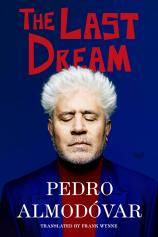The Last Dream
Review
The Last Dream
At the Venice Film Festival in September, Spanish film director and screenwriter Pedro Almodóvar received an 18-minute standing ovation for his first English-language movie, The Room Next Door, starring Julianne Moore and Tilda Swinton. His storied career takes a new turn with the arrival of his first book of stories --- some are personal and comic, while others are fables and a little gothic fiction.
Almodóvar is all over the map when it comes to his inspirations and his subjects, but here the most fascinating figure is himself. THE LAST DREAM, which is beautifully translated by Frank Wynne, is a fantastic collection of memories and anecdotes from the last 50 years of his creative musings.
"It is a rare gift for a writer to tackle so many genres at the same time, and Almodóvar does not give them all equal weight. Still, THE LAST DREAM is an outstanding addition to his storytelling oeuvre."
In his introduction, Almodóvar writes, “I’ve been asked to write my autobiography more than once, and I’ve always refused; it’s also been suggested that I let someone else write my biography, but I have always felt somewhat resistant to the idea of a book entirely about me as an individual. I’ve never kept a diary, and whenever I’ve tried, I’ve never made it to page two; in a sense, then, this book represents something of a paradox. It might best be described as a fragmentary autobiography, incomplete and a little cryptic.” This makes THE LAST DREAM a fascinating volume.
Almodóvar’s interests here match up with the topics that he explores in his films: religion, sexuality, queerness, family relations and plain old love. The title story concerns the death of his beloved mother, actress Francisca Caballero, a relationship he mined for decades because of how close they were. He displays his love of cinema in passages such as this one, where he likens his mom to Marlene Dietrich: “Her dress, her hat, and her various accessories are identical to those worn by…Dietrich…in The Devil Is A Woman. More than an impersonation, the woman’s movements perfectly embody those of the famous star.”
In Almodóvar's tiny Spanish town, Francisca is the height of beauty and sophistication. He compares her at her most lovely to her most crippled times and gives an honest impression of the care and respect he always had shown her and how difficult her death has been on him.
Almodóvar is not a young man, and he has a very eclectic and revolutionary body of work. A story like “Redemption,” where he creates a love affair between Jesus and Barabbas, showcases the bold connections he imagines between religion and sexuality. He is not being disrespectful to his Catholic roots; he is trying to imagine where his queer lifestyle could stop being seen as a danger to the church. He wants his spiritual life and his sexuality to come to terms with each other so he can be at peace with God and his existence. It’s a brave statement and an earnest search for contentment in a somewhat volatile culture.
Like John Waters with American Catholicism, Almodóvar looks for the sacred and profane in all his relationships. In “Joanna, the Beautiful Madwoman,” Catholicism is explored through a fable about a Catholic queen. Religion is even at the center of these fictional pieces.
It is a rare gift for a writer to tackle so many genres at the same time, and Almodóvar does not give them all equal weight. Still, THE LAST DREAM is an outstanding addition to his storytelling oeuvre. Perhaps he is being very open with his readers about his own life, but clearly this is no actual attempt at a memoir.
Reviewed by Jana Siciliano on October 5, 2024
The Last Dream
- Publication Date: September 24, 2024
- Genres: Fiction, Nonfiction, Short Stories
- Hardcover: 240 pages
- Publisher: HarperVia
- ISBN-10: 0063349760
- ISBN-13: 9780063349766



